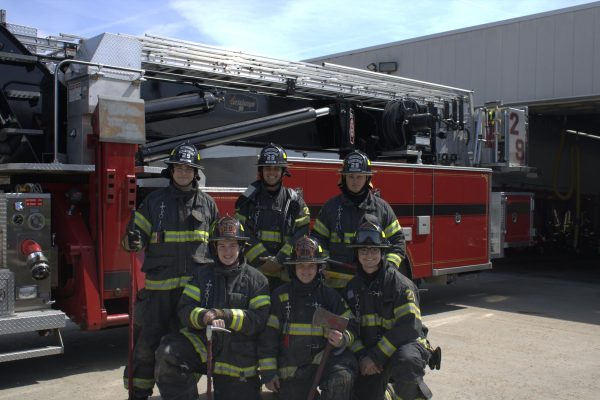Playshop’s “Machinal” explores mental health
The audience sat at the edge of their seats as the main character confessed to the crime of killing her husband in the name of freedom. The Playshop Theatre at Allegheny presented “Machinal” from March 30 to April 2 in the Gladys Mullenix Black Theater.
“Machinal” follows the life of a young woman named Helen as she battles with mental health, postpartum depression and the struggles of being a woman in a world that was not equipped to understand and help her. The play was loosely based on the trial and execution of Ruth Snyder for the murder of her husband in the 1920s.
Visiting Assistant Professor of Theatre Rachel Hoey, who directed the production, explained that because this is her first year at the college, she wanted a play that could give more students the opportunity to be on stage and purposefully selected a production with darker themes.
“Not all plays are super happy plays, and plays make us question and key in and see what happens next,” Hoey said. “I thought this was a really great example of a dramatic and sometimes difficult work to chew through with.”
While many messages could be derived from the play, primary themes revolved around mental health and how people can often feel alone in the world, according to Hoey.
“It’s one of the first feminist pieces in our modern canon,” Hoey said. “We find a woman who is oppressed by society’s expectations and what she has to do in order to survive. You will see in some of the monologues where the lighting shifts and gives us these windows into Helen’s psyche.”
Dramaturg Madeline Segar, ’24, explained some of the behind-the-scenes work of creating the world shown in the play. A dramaturg works with the producers through providing research and literary advice.
“Since it is a historical show, that involves a lot of research about the time period,” Segar said. “The play has a lot of themes about mental health and that sort of thing so I looked up some standard mental health practices of the time which was probably the most interesting part because their approaches were very different.”
Segar said that one of the interesting qualities of the play is that it shows the perspective of women right after the suffrage movement.
“I think everyone thinks of the ’20s as like the Roaring ’20s where everything is so great, the economy is great and everyone is great,” Segar said. “But we get a perspective where people are troubled and I think that is interesting.”
Many scenes in the play featured the main character’s inner thoughts, which were transitioned in and out of through lighting and music changes. Every scene had different props, and brief intermissions allowed for the actors to quickly put together new scenes.
The lead actor of the play, Isabella James, ’24, had a troublesome time getting into character as Helen.
“It was definitely difficult to find her as a character because she is so often tender at points and timid but also searching for freedom,” James said. “I had to do a lot of monologue work and a lot of deep diving into the lines through interactions with the characters.”
Actors rehearsed from Sunday to Friday for three hours a night during the span of two months, according to James.
“It has definitely been difficult because I am a STEM major and so a lot of my classes have a lot of labs and work put into them that aren’t theater-related,” James said. “I would come back from rehearsal feeling pretty emotionally drained because Helen is a very emotional character and a lot of ideas of the play are very heavy and deep.”
Despite the amount of time involved in the production, James said she is grateful for the opportunity to be a part of theater production at college.
“I am very grateful for how everything has turned out and for the opportunity to be able to pursue something I am passionate about and love while also staying in touch with my pursuit of a pre-health career,” she said. “I think it’s cool that people from different majors and interests can come and experience something as magical as a live stage production and get to see the kind of art and passion that other people are putting into things they love as well.”

Evelyn Zavala is a senior from San Francisco. She is majoring in Business and minoring in Journalism in the Public Interest. This is her fourth year on...






